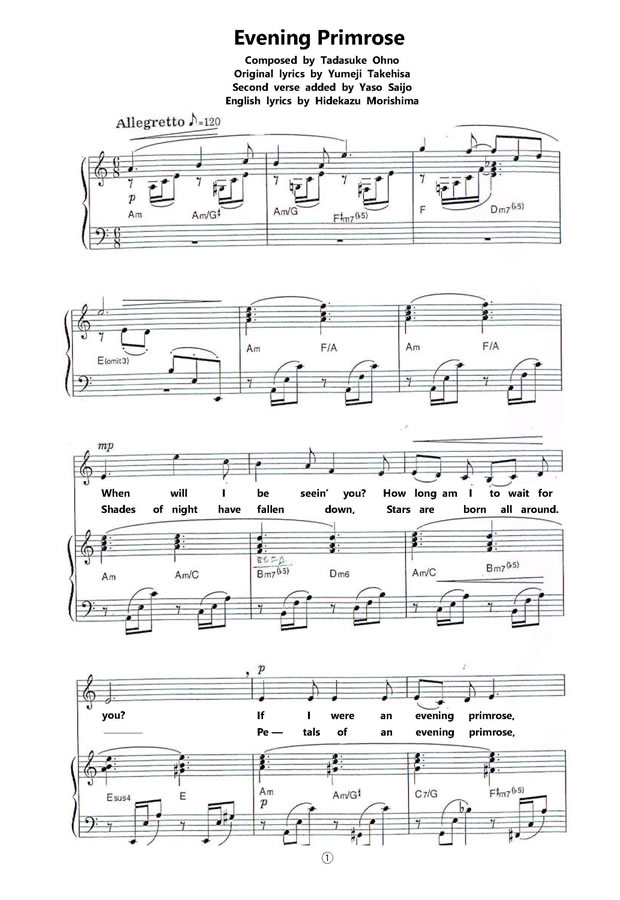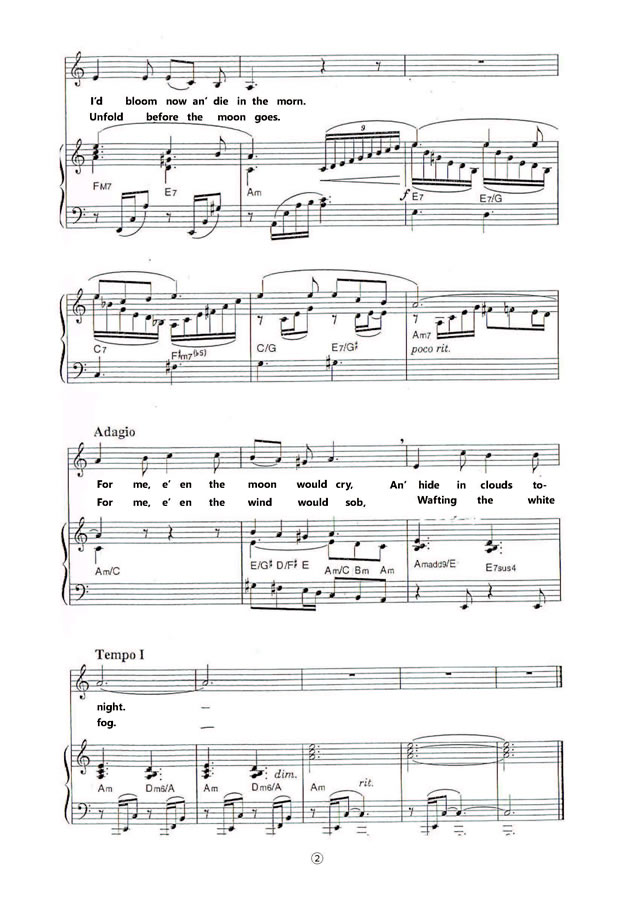![]() Music
Music
Let’s sing Japanese songs in English –February 2018
This month’s song is “Evening Primrose”(the original Japanese title “Yoimachi-gusa”)
The song of February, 2018, is “Yoimachi-gusa”, which I gave English lyrics titled
“Evening Primrose”. Yoimachi-gusa literally means a grass waiting for evening, and I understand that “evening primrose” is the English name for it. This flower is supposed to bloom in the evening and wither in the morning.
The lyric of the song was originally written as a poem on its own by Yumeji Takehisa, an illustrator/designer and poet.
In 1910, he made a trip to Boso Peninsula in Chiba Prefecture, going through Choshi Village and Inubou-Saki, and stayed at an inn on Ashika Island off Choshi, and there he met a 19-year old girl named Taka who had come from Northern Japan of Akita Prefecture, and it was an instant love affair between them, but due to various reasons and considerations of the families, the love did not materialize. Yumeji wrote in sorrow a piece of poem titled Yoimachi-gusa in 1912, with the evening primrose, tending to bloom in the evening and wither in the morning, as an analogy to the lost love.
An abridged version of the poem was published later, and it drew the attention of a violinist, Tadasuke Ohno, who gave music to the poem, and he himself performed the music in 1917. By 1918, a full score sheet of the song was published with Yumeji’s own illustration appearing on the cover, and it became an instant nation-wide hit.
In 1938, 4 years after his death, a movie was planned on with a title “Yoimachi-gusa”, named after the song which had maintained a huge popularity, and the theme song for the film was of course that famous one, and even a second verse was added, written by Yumeji’s friend and poet, Yaso Saijo.
The song is still sung today by many singers, and in 1971, a monument was erected on a spot in Ashika Island, Chiba Pref.,overlooking the sea in front. The monument has the sculpture of Yumeji Takehisa with a part of the verse from the song inscribed on a plaque.
Yumeji Takehisa was born in Okayama Prefecture in 1884, and died in 1934, aged 49.
He was buried in Zoshigaya Cemetery, Tokyo, with the goodwill of a friend.
(The above sentences are written by me based on Wikipedia Japan article)
I posted both the original Japanese lyrics (so good and old) and my English lyrics which hopefully reflects the melodramatic atmosphere of the lost love.
(宵待草)
美人画で有名な竹久夢二は、家庭問題を引きずりながら1910年のある数日、房総半島に旅し、銚子、犬吠埼などを廻る中、海鹿島(あしかじま)にある旅館に投宿。
そこにたまたま来ていた秋田出身のたか(19)を見染め、二人は恋仲となる。その後、たかの行く末を案じた父親が別の一般男性と結婚させたこともあり、二人の仲は消え去るのみとなった。
これを儚(ハカナ)んだ夢二は、1912年に詩を書き、「宵待草」と題した。宵に花開き、夜明けと共にしぼむ花に自分たちの愛をなぞらえたもののよう。当時の著名なバイオリニスト、多忠亮(オオノタダスケ)がこの詩に注目し、曲を付け、1917年に発表、その後発刊された夢二の表紙画付きの楽譜と共に、歌は国民的人気を博すに至った。
夢二の没後4年の1938年には、「宵待草」の人気にあやかるように、映画化が企画され、
当然の如く、この歌がテーマ・ソングとして考えられたが、歌詞の二番が欲しいとの求めがあり、夢二とも親交のあった詩人、西條八十が作詞した。
1971年には、あしか島の、海を見渡す場所に「宵待草」記念碑が建立され、夢二の像と、歌詞の一部が刻まれている。
竹久夢二は1884年岡山県で出生、1934年没。 享年49。 友人のはからいで、東京・雑司ヶ谷霊園に埋葬されている。
(ウィキペデイア日本版をもとにした情報)


“Evening Primrose”
- Composed by Tadasuke Ohno
- Original Lyrics by Yumeji Takehisa
- Second verse added by Yaso Saijo
- English lyrics by Hidekazu Morishima
1.
When will I be seein’ you?
How long am I to wait for you?
If I were an evening primrose,
I’d bloom now an’ die in the morn.
For me, e’en the moon would cry,
An’ hide in clouds tonight.
2.
Shades of night have fallen down,
Stars are born all around.
Petals of an evening primrose
Unfold before the moon goes.
For me, e’en the wind would sob,
Wafting the white fog.
〇宵待草(Evening Primrose)
多忠亮 作曲
竹久夢二 作詩
西條八十 作詞(二番)
英語雰囲気訳 森島英一
〇歌詞
1番
待てど暮らせど来ぬ人を
宵待草のやるせなさ
今宵は月も出ぬそうな
2番
暮れて河原に星一つ
宵待草の花の露
更けては風も泣くそうな
(1番は竹久夢二による原詩、2番は西條八十による追加歌詞)





